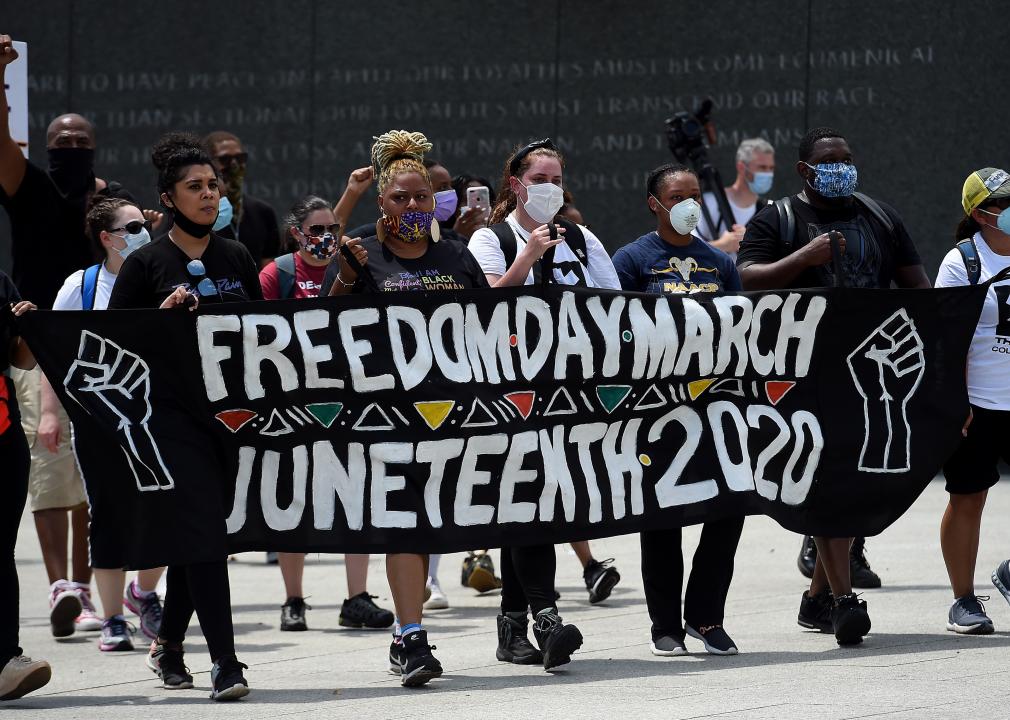Juneteenth becomes official: A major civil rights moment in Texas
OLIVIER DOULIERY // Getty Images
Juneteenth becomes official: A major civil rights moment in Texas
A land of contradictions from the outset, the United States was founded by slave owners who spoke passionately and eloquently about liberty, freedom, and justice for all. In the beginning, “all” was limited to men of European ancestry who were wealthy enough to own land. The Constitution’s protections did not apply to most of the people living in America for most of America’s history—at least not in full.
Women—about 50% of the population—were not included in the country’s concept of “all,” likewise millions of slaves—and for a long time, their offspring. Native Americans, the descendants of the original inhabitants of the United States, were commonly excluded from the promise of America, as were many immigrants, ethnic groups, and religious minorities.
Despite all the work that remains to be done, all of those groups and many others now enjoy freedoms that had to be won—won through the courts, through the court of public opinion, through mass demonstrations, through legislation, through boycotts, and in many cases, through martyrdom.
Fighting to expand the definition of “all” requires powerless people to challenge the power structures that benefit from keeping certain people locked in their status as second-class citizens. They often do it at great risk to their jobs, their reputations, their homes, and in many cases, their lives. Even so, brave advocates and activists fought the good fight in every state in America. Each state has a unique story to tell about the epic struggles for civil rights that were waged there, as well as those that continue to be waged. The following is a tiny sliver of their collective efforts.
Using a variety of sources, Stacker identified a defining moment for civil rights in all 50 states. They stand out for different reasons and led to changes that lifted different groups, but they all prove how much can be achieved—and how much still remains to be accomplished.
Keep reading to find out your state’s contribution to civil rights.
Texas: Juneteenth becomes official
News of the 1863 Emancipation Proclamation did not reach slaves in Texas for two-and-a-half years when Union Maj. Gen. Gordon Granger marched into Galveston on June 19, 1865, to announce the end of slavery and the Civil War to the last slaves still toiling for their masters on American soil. Also known as “Black Independence Day,” the moment has been enshrined as Juneteenth, one of the most important dates in civil rights history. In 1980, Texas became the first state to recognize Juneteenth as a holiday, and all but a handful of states honor the date, which has received renewed attention amid 2020’s racial turmoil.
Click here to see an event from every state or continue reading for other events near Texas.
Arkansas: Little Rock 9 go to school
In 1957, three years after the Supreme Court struck down school segregation in the Brown v. Board of Education decision, nine African American students attempted to integrate Central High School in Little Rock, Arkansas. It took several tries—they were physically blocked on the first few attempts by a combination of enraged white mobs and armed National Guard troops. Finally, President Eisenhower federalized the National Guard, ordering them to escort the students to and from the building, and on Sept. 25, 1957, the Little Rock Nine began attending classes at Central High.
Louisiana: A little girl brings a burden to school
At just 6 years old, tiny Ruby Bridges became a giant in November 1960 as the first African American child to integrate a Southern elementary school. Born the same year as the Brown v. Board ruling, Bridges began her education at a time when states were using every means at their disposal to resist the court’s ruling and prevent kids like her from attending white schools. Under the escort of U.S. marshals, the little girl braved an angry white mob on the way to her New Orleans school every day, but her courage signaled a point of no return for the civil rights movement, hammering one of the strongest nails yet in the coffin of systemic racism.
![]()

